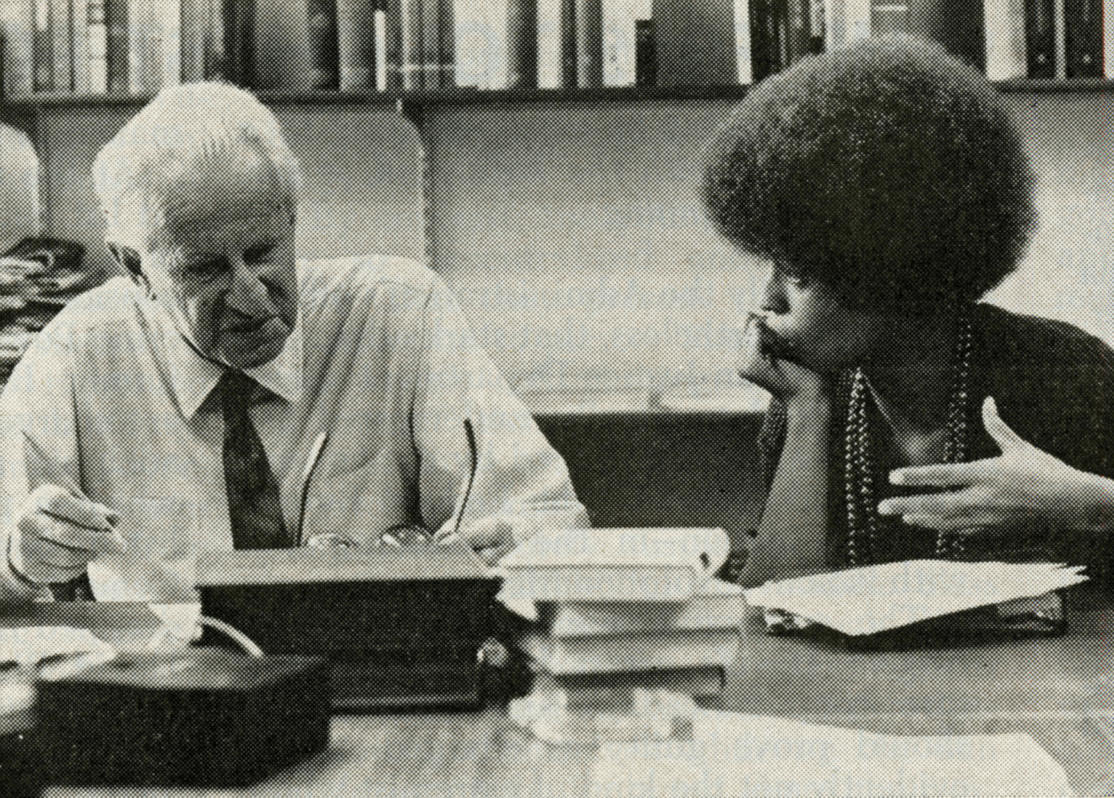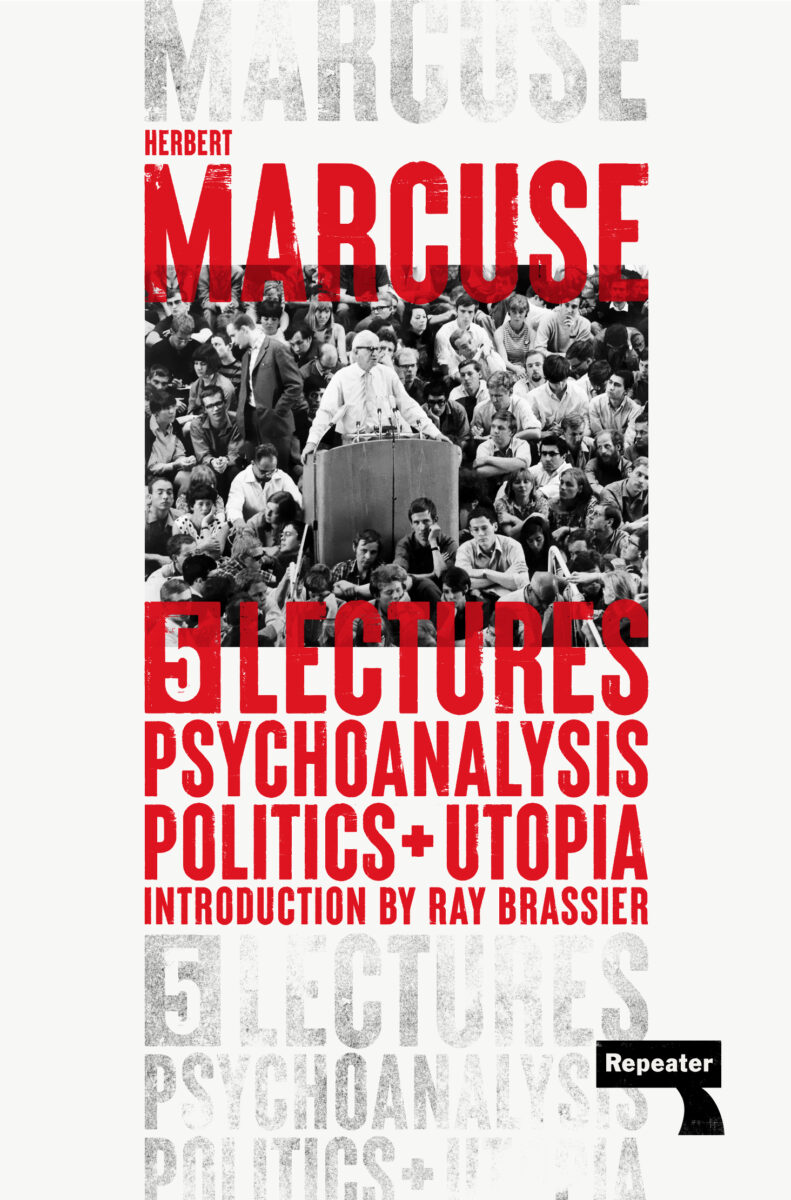Psychoanalysis, Politics, and Utopia: Five Lectures published by Repeater Books.
There aren’t many really revolutionary philosophers who want to change the world, not as deeply and radically as Herbert Marcuse, and for this alone he is worth reading and thinking with, even when it gets a bit heavy.
Marcuse was one of the key first-generation figures in the so-called ‘Frankfurt School’, taken on by the new Institute for Social Research before the Nazis took power, but had to flee Europe and play a leading role in intelligence gathering as part of anti-fascist activity when based in the United States, later taking up academic posts there. This is the trajectory that took him from being a doctoral student in Germany before the war with Martin Heidegger – a philosopher who romanticised the past and threw his lot in with the Nazis when they took power – to being an influential teacher of Angela Davis and, for his pains, Marcuse was denied permanent university appointments.

These five essays are gathered from different times, from the mid-1950s to the late 1960s, which was when Marcuse was able to more immediately connect again with revolutionary movements as an inspirational figure in the ‘New Left’, something he was credited with naming as something qualitatively different from old-style rather morally-conservative left-talking men in suits. That, then, and here is also something to bear in mind when we read mealy-mouthed ‘critiques’ of Marcuse for being an infantile ‘Utiopian’ communist, enabled him to connect with his own early revolutionary history; he had been a member of a soldiers council during the Spartacist uprising in Berlin in 1919. He never forgave the Social Democratic Party that sent in their paramilitary groups to quell that rebellion, during which Rosa Luxemburg and Karl Liebknecht were murdered (and these groups, the ‘Freikorps’, then became shock troops in the rising Nazi movement). Social democrat-inclined ‘social theorists’ then respond to that suspicion with the spiteful insinuation that Marcuse is ‘ultra left’.
When things are so bleak when it seems as if all possibility of resistance has been crushed or, worse, absorbed and its energy turned against anyone who rebels when everyone seems to be recruited into being an agent of their own oppression, what is to be done? Marcuse provides an analysis of the depth of the problem which never succumbs to pessimism, which always looks for any ‘crack’, any opening; for Marcuse, we live in a cultural-political-economic system that betrays the hopes of the past, covers it over, attempts to blot out attempts to change society, but we can retrieve those positive revolutionary hopes and bring them alive again.
Of a time
There is a paradox in Marcuse’s writing, something that is very clear in these five essays, and which is a source of strength and weakness (if we think dialectically about this, which we must, which is what he encourages us to do). On the one hand, these essays are of their time and marked by it, the last two essays given as lectures in Berlin in 1967, quite short interventions which are followed by lengthy thoughtful dialogue with students and activists who challenge him and make him clarify what he is saying. It is not only the audience that frames what is going on in these essays, and in the earlier ones in the book but the political context in which Marcuse found himself by the end of the 1960s. This is a time of rising protest against the US war in Indo-China, and solidarity with the Viet Cong is a priority. Marcuse knows this, and he sees the vanguard of that solidarity movement, and the basis for more wide-ranging revolutionary change in the student movement, a student movement that is connected with ‘third world’ revolutions.
So, one of the consequences of his assessment, which is based on that particular balance of forces in the United States, and which the Berlin students question him about, is that Marcuse does not see the working class as a revolutionary agent as such. In fact, this also leads him to think that the working class in the first world capitalist countries have been neutralised, bought off; alienation has become part of the name of the game for everyday life, and here we have some of the grimmest diagnoses that Marcuse became known for in critical social theory circles. The conceptual basis for this diagnosis is spelt out in the earlier essays on technological progress and on the way that what drives us as human beings is turned against us, becoming a force of repression.

It is there we find startling, and still useful notions; that we are subject now to a peculiar kind of ‘reality principle’ in which we must produce and perform, and this ‘performance principle’ that drives and pulls us into becoming little masters of others and of ourselves, locked into ourselves, brings with it an alluring and toxic illusion of freedom. In place of historical collective struggles for freedom – those that Marcuse wants to remind us still exist as latent possibilities – there is false freedom in which we think we are releasing and expressing something genuine but find ourselves simply still ‘performing’, enjoying as we have been told we should. This is, Marcuse argues, ‘controlled liberalization’ that is still repressive. It looks and feels like we are releasing something that has been channelled, ‘sublimated’ into this ‘vicious circle of progress’ of commodity culture, but it is repressive, it is what Marcuse calls ‘repressive desublimation’.
We just need to think of the way that every counter-revolution involves not only brute violence – the kind of thing Marcuse experienced in Berlin in 1919 during the quelling of the Spartacists – but emotional numbing and the ingraining of disappointment so we come to believe change is not possible and we repeat that pessimistic message to anyone who is trying to change the world. After the French Revolution, then, there was ‘Thermidor’, the period of reaction in which the revolutionaries were crushed, and a repressive regime was sedimented, and that then becomes the model for Trotsky’s analysis of the reaction inside the Soviet Union against the Russian Revolution; the revolution betrayed is, he points out, ‘Thermidor’. And what Marcuse adds to this is an analysis of the way that failures and repression involve what he refers to as ‘psychic Thermidor’, the drumming into each individual, into the inside of each individual that they better make do with what little power they are given in this wretched repressive society.
Looking to the past
While these essays are of a time, the one side of the paradox in the book, they are also quite romantic; that is, Marcuse, rather like his old supervisor Heidegger, looks to the past as a source of hope. The risk he is willing to take is to look to the archaic biological heritage of the human being, and this is where Freud and psychoanalysis are woven into the story. The editors of the essays point out that the term that was, in Marcuse’s time, translated as ‘instinct’ should be translated as ‘drive’, and the drive is something that is more malleable, more historical. But even so, when Marcuse writes about Freud, he takes on good coin the description of what he refers to as ‘two basic drives’, of life and death. Yes, it may be true that we are driven to destroy ourselves as well as create new possible forms of relationship and society – there is something of life and something of death in what we do – but Marcuse traces this opposition to underlying forces that Freud had reified, turned into underlying interminable forces.
The third essay, for example, is on the ‘obsolescence’ of Freud, but the sting in the tail, and this is where Marcuse attempts to redeem something from the pre-history of capitalism, is that while psychoanalysis seems to be speaking of things in the past that are ‘obsolescent’, actually those things are still buried, still possible, still able to be brought alive again. So, it is not the ability to labour and the working class that is agent of change, a force that is created by capitalism itself as its own gravedigger (which would be the Marxist line) but the re-finding of ‘erotic energy’; what we should celebrate if Marcuse is right, is not work but ‘pleasure’.
There is something in this, something that Marcuse touches on in his comments about the role of ‘demonstrations’ in resistance against society, and of the way, we might find ways of working with ‘humanitarian progress’ instead of ‘technological progress’; for Marcuse, ‘demonstrations’ are sites in which we demonstrate not only against what is wrong but enact an alternative. We ‘demonstrate’ that another society is possible, live it, perhaps experience it for a moment, and show that there is an alternative; to declare that ‘civilization arises from pleasure’, however, risks replacing a Marxist account of the role of labour in our lives as human collective beings with a too-simplistic and reductionist Freudian account.
Redemptive reading
I suggest you read the essays in reverse order. Start with essays 4 and 5 from 1967; they are clearer, not bogged down with Freudian jargon, and have the questions and discussion included. Then track back to essay 3, the 1963 essay which does give the clearest account in the book of what is radical about psychoanalysis. Essays 1 and 2 from 1956 are more difficult, and if you can get through those you should be better placed to make sense of the frankly too-dense ‘introduction’ to the essays which does, even so, usefully remind us that Marcuse historicises the unconscious rather than seeing its operations as eternal and universal, and spells out the stakes of Marcuse’s analysis of ‘alienated labour’ for an account of the importance of production and not merely consumption.
It was Marcuse who gave us the really useful phrase ‘second nature’ to describe how what we experience of ourselves is not given directly by our biology but always mediated, always historical. That is too much for some hard-line psychoanalysts who won’t give up on the idea that what they are describing is real bedrock unchanging biological human nature. There are moments, as I’ve noted already, where Marcuse breaks from key tenets of Marxism, but actually his claim that we should find a way of finding revolutionary change ‘within’ labour rather than ‘beyond’ labour is quite compatible with Marxism. Surely we do want to build a world in which labour is enjoyable, pleasurable, rather than being a drudge.
A first footnote to the introduction of this book is a quote from Theodor Adorno, one of the most well-known of the Frankfurt School philosophers; that the only philosophy that can be practised in the face of despair is from ‘the standpoint of redemption’. This is indeed what Marcuse did, and as close to actual political practice as he could, making use of his position as a theorist to link with and energise new social movements in order to redeem the hopes of the past, to find cracks in what seemed like total control of society in the service of capital accumulation, to write for the resistance.
Art Book Review Books Campism Capitalism China Climate Emergency Conservative Government Conservative Party COVID-19 Creeping Fascism Economics EcoSocialism Elections Europe Far-Right Fascism Film Film Review Fourth International France Gaza History Imperialism Iran Israel Italy Keir Starmer Labour Party Long Read Marxism Marxist Theory Migrants Palestine pandemic Police Protest Russia Solidarity Statement Trade Unionism Ukraine United States of America War Women

